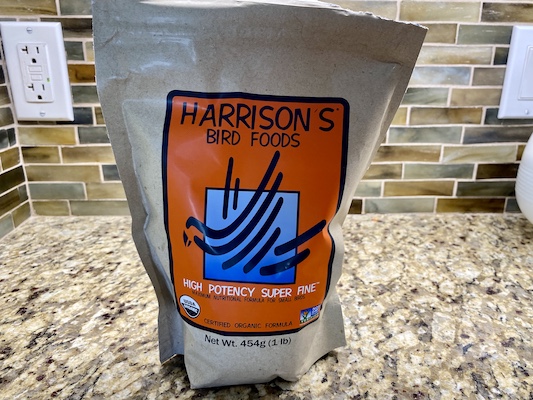
If you really want to use pellets
I’ve made many strong cases against feeding birds a processed (pellet) diet:
- Pellets are processed food
- Natural vs artificial vitamins
- What causes Fatty Liver Disease
- Animal research into fat, carbohydrates, and disease
Those are just a few. But if you really want to feed your bird pellets, I have some suggestions. First off, this is the recommended fat intake for humans from two sources:
National Academy of Sciences: 20-35% calories from fat
US Federal Dietary Guidelines: 20-40% calories from fat (depending on age)
Most pellets have roughly 5% fat content, meaning they have a very high carbohydrate content. Revisit this link for more on why a low-fat content is bad.
Some popular pellet brands and their fat content:
- Roudybush Daily Maintenance Bird Food = 6%
- Zupreem Fruit Blend = 4%
- Lafeber Avi-Cakes = 4.5%
If you want to give your bird an amount of fat that is closer to being healthy, consider Harrison’s, which has the added benefit of being organic. The “High Potency” line has three products that vary from 12% to 15% in fat content.
On top of that, taking advantage of a bird’s natural inclination for seed, you could add some seeds like hemp or flax seeds, which add good Omega fatty acids and raise the fat content. Alternatively, you could do a spritz of olive oil on the pellets and mix it around.
There’s a study sponsored by the American Heart Association that admits that a high-fat diet is good at reducing hardening of the arteries.
We have investigated the effect of most common oils used in human nutrition on the development of atherosclerosis in apoE-knockout mice. Seven groups of animals, separated according to sex, were fed for 10 weeks either chow diet or the chow diet 10% (wt/wt) enriched with different oils (palm, coconut, 2 types of olive oil, and 2 types of sunflower oil) without addition of cholesterol. At the end of this period, plasma lipid parameters were measured and vascular lesions scored. None of the diets induced changes in plasma cholesterol concentrations, whereas plasma triglycerides were uniformly reduced in all diet groups. Some diets caused significant reductions in the size of atherosclerotic lesions in males and others in females; males responded most to sunflower oils and females to palm oil and one olive oil
Low-Cholesterol and High-Fat Diets Reduce Atherosclerotic Lesion Development in ApoE-Knockout Mice—Arteriosclerosis, Thrombosis, and Vascular Biology—Oct 1999
Cholesterol is not an issue for birds unless they are meat-eating or eat an unusual amount of eggs. Tremendous food for thought here.

